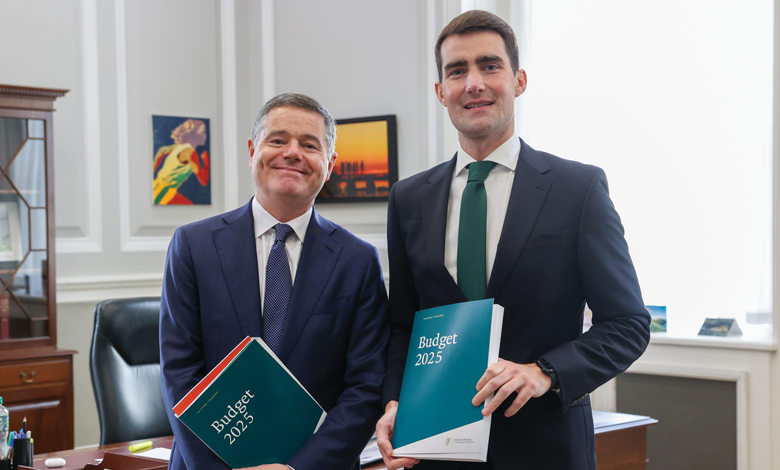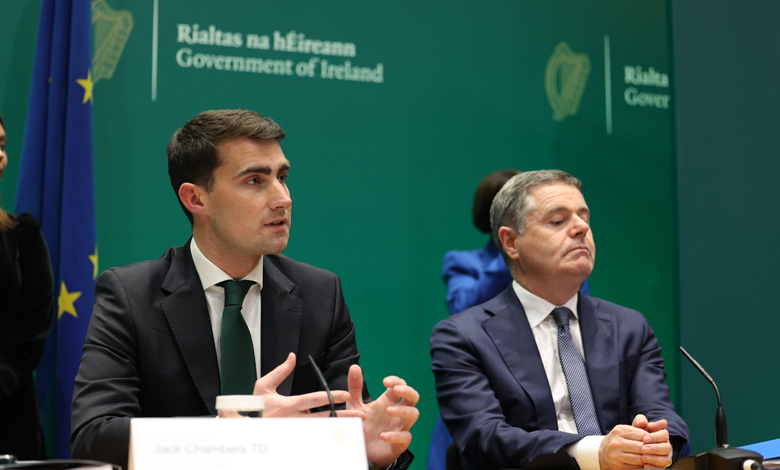Budget 2025: Continued over-reliance on corporate tax receipts

The Government’s Budget 2025 has again indicated that the State’s economy has an over-reliance on corporation tax receipts, with warnings that this continuation leaves Ireland’s economy vulnerable to running up future deficits.
The Budget, which was announced on the 1 October 2024, was both the first for Minister for Finance Jack Chambers TD and the last for the Government.
The Minister said that the Budget presented a unique opportunity to “plan, transform and deliver for the future”.
With an impending general election expected before the end of 2024, the Government has attempted to walk a tightline to appease both corporations and citizens during a cost-of-living crisis.
The Budget is worth €8.3 billion in tax changes and new spending measures were accompanied by a booming cost-of-living crisis package worth €2.2 billion.
For the fourth Budget in a row, the Government finds itself in a budgetary surplus which, along with moderate growth, reduces the State’s net debt ratio over the coming years despite a number of ‘one-off’ cost-of-living measures.
State of the economy
The Consumer Price Index (CPI) rose by 1.7 per cent between August 2023 and August 2024, down from an annual increase of 2.2 per cent in the 12 months to July 2024.
This figure marked the first time since June 2021 that the State’s official measure of annual inflation has been below 2.0 per cent.
In his address to the Oireachtas, Chambers stated “inflationary pressures have eased considerably, our domestic economy has grown at a robust pace and we continue to experience record high levels of employment”.
Consensus among the Nevin Economic Research Institute (NERI), the Irish Business and Employers Confederation (Ibec), and the Irish Fiscal Advisory Council (IFAC) is that the Irish economy remains strong, is operating at or above potential, and the State’s labour market has “never been stronger”.
However, both NERI and the IFAC find that like Budget 2024, Ireland’s over-reliance on tax receipts represents a “dangerous fragility within the tax base”. The Department of Finance’s Stability Programme Update notes that up to half of the corporation tax yield in 2022 cannot be explained by economic fundamentals, while the Fiscal Council in its Fiscal Assessment Report notes that around 43 per cent of all corporation tax receipts come from just three corporate groups.
Therefore, the State’s fiscal outlook is highly dependent on the commercial fortunes and tax decisions of a tiny number of companies making decisions outside of Ireland.
Furthermore, like Budget 2024, the Government has breached its own spending cap of 5 per cent, with Budget 2025 increasing government spending by 6.9 per cent, along with tax cuts worth €1.4 billion.
While it is not uncommon for outgoing governments to increase spending, the Government was able to spend more after it acquired an extra €14.1 billion in unpaid taxes from Apple after a European Court of Justice ruling, which ultimately allowed for more public spending from the outgoing coalition.
Minister for Public Expenditure, National Development Plan Delivery and Reform, Paschal Donohoe TD, who designed the spending cap rule in 2021, defended breaching their rule for the third successive year, stating it had “performed an important service” in putting downward pressure on spending after bigger increases during the Covid-19 pandemic.
Chair of the State’s budgetary watchdog, Seamus Coffey says that while the Government continues to make big promises, it is driving up prices and making it harder for people to afford the basics.
“Price increases may have slowed, but there are many areas where pressures remain high,” Coffey states.
“If we are to learn from past mistakes, now is the time for the Government to stick to its own rules rather than to have hit reverse later on, and potentially in the next recession.”
Cost-of-living
This year, the monthly cost-of-living for a single person in Ireland is an estimated €990.10 not including rent. For a family of four, the estimated monthly cost-of-living is €3,467.40 with rent excluded, despite inflation falling from 4.1 per cent at the start of 2024, to 2.2 per cent by mid-2024.
Minister Chambers stated the aim of Budget 2025 was to design a budget with the intention of “strengthening communities, building prosperity, tackling the cost-of-living challenges and enhancing living standards”.
He states that the Budget includes a cost-of-living package that is designed to support the most vulnerable and ease the financial burden over the winter months.
Contained within the package are two €125 electricity credits, with one being paid in 2024 and the next in 2025. There will also be a minimum wage increase by 80 cents from 1 January 2025, rising to €13.50 an hour. As part of the package, citizens will receive a 9 per cent of VAT rate on electricity and gas bills, which will be extended to the end of April 2025.
Unlike previous budgets, the Government has not introduced any ‘one-off’ measures to alleviate the cost-of-living crisis for households. The measures already in place have spawned criticism from opposition parties.
Sinn Féin’s spokesperson on Finance, Pearse Doherty TD, says the latest Credit Union Consumer Sentiment Index shows the failure of Budget 2025 to make a difference in people’s lives.
“People continue to be hit hard by the cost-of-living,” Doherty states. “The reality of the budget is that it barely keeps pace with inflation. That is why half of the public believe Budget 2025 will make no improvement to their living standards, because that has been their experience under this government.”
He added: “People hear about the millions and billions, but they do not feel better off. For most people it is about what’s left at the end of the week.”
“I believe that Budget 2025 is one that has common good at its core.”
Minister for Finance Jack Chambers TD
At the same time, the Government has also introduced a range of increases in tax credits for carers, with Minister Chambers acknowledging: “Carers play a fundamental role in our society.” Budget 2025 will see the carer’s allowances means-test disregard will increase to €625 for a single person and €1,250 for a couple. The domiciliary care allowance will increase by €20 and the carer’s support grant will increase by €150.

The Government have also instituted a one-off €400 lump sums in November 2024 for carer’s support grant, disability allowance, blind pension, invalidity pension and domiciliary care allowance.
Housing
The Government has allocated €6 billion of capital investment for housing. Of this €6 billion, the Government has allocated €3.1 billion in the exchequer funding, €1.25 billion to the Land Development Agency (LDA), and the €1.6 billion to the Housing Finance Agency (HFA).
To deliver on the Government’s aim of increasing housing supply, Minister Chambers has allocated just under €2.2 billion (an increase of €275 million on 2024), with the objective of delivering 10,000 new-build social homes (700 additional homes as set out in 2024), under the Social Housing Investment Programme (SHIP), Capital Advance Leasing Facility (CALF), and Capital Assistance Scheme (CAS).
Infrastructure and investment
In October 2024, Minister Chambers announced a first annual transfer 0.8 per cent of GDP into the Future Ireland Fund (FIF) which amounts to €4.05 billion. This built on the previous transfers in 2024 from the National Reserve Fund, with transfers of €2 billion to the Infrastructure, Climate and Nature Fund (ICNF) and €4.3 billion to the FIF.
The Government has announced that a further €6 billion will be transferred into the FIF and the ICNF, bringing the total amount of funding to the two funds to €16 billion by the end of 2025.
NERI stated the creation of the two new investment funds (FIF and ICNF) were very welcome but warned “these funds do not ‘solve’ the looming fiscal squeeze. In the long run, government revenue as a share of output will have to increase”.
Minister Chambers announced that he would be allocating €3 billion for infrastructure spending, with €1 billion being dedicated to water infrastructure, which he states will allow for works to be carried out across the country on capital projects related to remedial action lists, connections for new housing, and addressing urban wastewater pressures.
To adhere to the Climate Action Plan’s target to increase the share of electricity generated from renewable sources up to 80 per cent by 2030. Chambers has allocated €759 million to facilitate an initial, direct equity injection to support capital spending on the further development of Ireland’s electricity grid infrastructure.
Taxes
Chambers forecasts his department’s tax revenue to amount to €105.7 billion, an increase of €13.6 billion on the State’s Spring forecast, which is mostly attributed to corporation tax receipts and the revenue for the Court of Justice of the EU judgement.
He has also instituted a personal income tax package of €1.6 billion in Budget 2025 which he describes will “support low and middle income earners”.
Contained within the package, the Government will increase the maintain tax credits, the Personal, Employee and Earned Income Credits by €125, increase the Standard Rate Cut Off Point by €2,000 to €44,000, with proportionate increases for married couples and civil partners and will reduce the USC rate from 4 per cent to 3 per cent.
However, this has received criticism from the main opposition party, Sinn Féin, with party leader Mary Lou McDonald TD and finance spokesperson Pearse Doherty TD outlining in the party’s alternative budget that it would abolish the USC rate on incomes up to €45,000 including removing it for incomes up to €30,000 in its first year in office if it enters government.
Broad analysis
In his concluding remarks to the Oireachtas, Chambers stated: “I believe that Budget 2025 is one that has common good at its core. It allows us to ensure that we keep striving to provide better services and infrastructure for everyone, to build better communities and support social enterprise [and] to provide for those most in need.”
However, NERI warns that while the economy appears to be operating above potential, it does not need additional stimulus from an expansionary budget, instead indicating that a countercyclical budget “appears prudent”. Subsequently, NERI called for a cautious budget that invests sufficiently in the long-run components of sustainable productivity-based growth and protects lower income households, implying the need for taxes to increase in this Budget.
As indicated by the NERI, Ibec and IFAC, Ireland’s economy remains in a strong position, and this is the message each party in the coalition government will be keen to champion heading into the general election with a “strong labour force”. However, a closer look at the figures once again shows that the State has an overreliance on corporate tax receipts, and this leaves an underlying vulnerability for Ireland’s economy as well as undercutting the authority by the State’s decision-makers.
The Parliamentary Budget Office (PBO) has said that there is an over concentration with the State’s finances and states that 89 per cent of tax receipts are still forecasted to just come from three sources. The PBO states “These are inherently interdependent, posing significant sustainability risks over the long term.”
The PBO emphasises that while Budget 2025 tax measures are increasing take home pay for workers, they are conscious that the economy is at full capacity and that these tax measures may add to inflationary pressures. For clarity, the PBO are seeking further detail on the methodology for costing tax proposals, they state it would “enhance budgetary scrutiny”.





